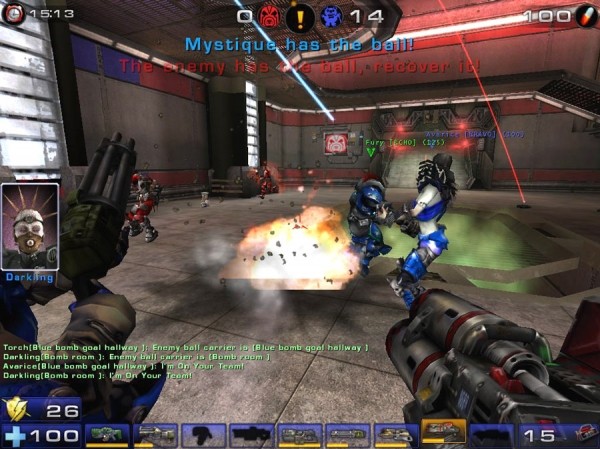Programmers were tasked with the challenge of creating the most human-like UT2004 bots – and it appears they delivered. In the competition sponsored by 2K games, the top two UT2004 bots tricked 52 percent of the judges into thinking they were guided by flesh and bone. To put that into context, the average "humanness" rating of living players was only 40 percent. This de-humanizing finding meant that some bots were judged to be significantly more human than their human couterparts.
As a long-time UT2004 player, this brought back fragrant memories of being charred to a smokey cinder by relentless "Godlike" bots with impeccable alt-fire plasma gun skills. Of course, that was the default AI. In this challenge, bots were armed with custom AI routines which actually aim to be far from perfect, giving them more human-like affect.
"The idea is to evaluate how we can make game bots, which are non-player characters (NPCs) controlled by AI algorithms, appear as human as possible," said Risto Miikkulainen, a computer science professor from the College of Natural Sciences.
Amongst some of the interesting behaviors baked into these clever AI algorithms were grudges. Computer opponents would sometimes angrily pursue certain players of interest, often to their own detriment – an undoubtedly human thing to do.

Other modifications included a less perfect aim while making rapid movements and a natural selection-like system where successful bots would pass on presumably beneficial abilities to future spawns, gradually improving bots and better matching player difficulty.
If we just set the goal as eliminating one's enemies, a bot will evolve toward having perfect aim, which is not very human-like. So we impose constraints on the bot's aim, such that rapid movements and long distances decrease accuracy. By evolving for good performance under such behavioral constraints, the bot's skill is optimized within human limitations, resulting in behavior that is good but still human-like.
Source: phys.org
Described as a "Turing test for game bots", the results of the contest were announced at the IEEE's Computational Intelligence and Games conference. The winning bots, UT^2 and MirrorBot, split the $7,000 prize. The "Turing Test" is Alan Turing's famous hypothesis which concludes a machine may be capable of thought when it, through a series of probing questions, produces answers indistinguishable from that of a human being.
For anyone interested, the Unreal Tournament 2004 mod and the bots themselves are available for download here.
